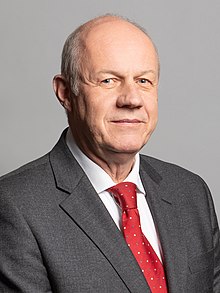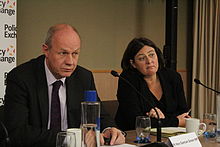Damian Green | |
|---|---|
 Official portrait, 2020 | |
| First Secretary of State | |
| In office 11 June 2017 – 20 December 2017 | |
| Prime Minister | Theresa May |
| Preceded by | George Osborne[a] |
| Succeeded by | Dominic Raab[b] |
| Minister for the Cabinet Office | |
| In office 11 June 2017 – 20 December 2017 | |
| Prime Minister | Theresa May |
| Preceded by | Ben Gummer |
| Succeeded by | David Lidington |
| Secretary of State for Work and Pensions | |
| In office 14 July 2016 – 11 June 2017 | |
| Prime Minister | Theresa May |
| Preceded by | Stephen Crabb |
| Succeeded by | David Gauke |
| Minister of State for Policing and Criminal Justice | |
| In office 4 September 2012 – 14 July 2014 | |
| Prime Minister | David Cameron |
| Preceded by | Nick Herbert |
| Succeeded by | Mike Penning |
| Minister of State for Immigration | |
| In office 13 May 2010 – 4 September 2012 | |
| Prime Minister | David Cameron |
| Preceded by | Phil Woolas |
| Succeeded by | Mark Harper |
| Chair of the Culture, Media and Sport Committee[a] | |
| Acting 25 April 2023 – 17 May 2023 | |
| Preceded by | Julian Knight |
| Succeeded by | Caroline Dinenage |
| Acting 10 January 2023 – 31 March 2023 | |
| Preceded by | Julian Knight |
| Succeeded by | Julian Knight |
| Chair of the One Nation Conservatives Caucus | |
| In office 24 July 2019 – 30 May 2024 | |
| Leader | Boris Johnson Liz Truss Rishi Sunak |
| Preceded by | Nicky Morgan & Amber Rudd |
| Member of Parliament for Ashford | |
| In office 1 May 1997 – 30 May 2024 | |
| Preceded by | Keith Speed |
| Succeeded by | Sojan Joseph |
| Shadow Cabinet portfolios | |
| 2001–2003 | Shadow Secretary of State for Education and Skills |
| 2003–2004 | Shadow Secretary of State for Transport |
| Personal details | |
| Born | Damian Howard Green 17 January 1956 Barry, Wales |
| Political party | Conservative |
| Spouse | Alicia Collinson |
| Children | 2 |
| Alma mater | Balliol College, Oxford |
| Signature | |
| Website | Official website |
| a. ^ Office vacant from 13 July 2016 to 11 June 2017. b. ^ Office vacant from 20 December 2017 to 24 July 2019. | |

Damian Howard Green PC (born 17 January 1956)[1] is a British politician who served as First Secretary of State and Minister for the Cabinet Office from June[2] to December 2017 in the second May government. A member of the Conservative Party, he served as Member of Parliament (MP) for Ashford from 1997 to 2024.
Green was born in Barry, Vale of Glamorgan, in Wales and studied philosophy, politics and economics at Balliol College, Oxford. He is married to the barrister Alicia Collinson who was a contemporary of Theresa May at St Hugh's College, Oxford.[3]
After working as a journalist for the BBC, Channel 4 and The Times, he entered parliament at the 1997 general election by winning the seat of Ashford in Kent.
Green served in several shadow ministerial positions, including Shadow Transport Secretary and Shadow Education and Skills Secretary. He came to national prominence in November 2008 after being arrested and having his parliamentary office raided by police, although no case was brought.[4] He served in the Cameron–Clegg coalition until July 2014, first as Minister of State for Immigration and then as Minister of State for Police and Criminal Justice.
Green was appointed as Secretary of State for Work and Pensions by Prime Minister Theresa May in July 2016. Following the 2017 general election, he was promoted to First Secretary of State and Minister for the Cabinet Office. After the results of an inquiry into allegations that he sexually harassed a woman and viewed pornography on a work computer were published, it was found that he had breached the ministerial code and he was instructed to resign from the cabinet amidst the 2017 Westminster sexual misconduct allegations.[5] He became chair of the One Nation Conservatives caucus following the formation of Boris Johnson's government in July 2019. In January 2023, he became acting chair of the Digital, Culture, Media and Sport Committee after Julian Knight temporarily stood aside, and again in April 2023 after Knight resigned.
At the 2024 general election, Green lost the Ashford constituency to Sojan Joseph of the Labour Party amidst a strong nationwide swing from the Conservatives. This represented the first time since 1929 that the seat had returned a non-Conservative MP.[6]
Cite error: There are <ref group=lower-alpha> tags or {{efn}} templates on this page, but the references will not show without a {{reflist|group=lower-alpha}} template or {{notelist}} template (see the help page).
- ^ "Damian Green". BBC News. 21 October 2002. Retrieved 22 April 2022.
- ^ "Election 2017: Prime Minister and Cabinet appointments". UK Government. 11 June 2017. Archived from the original on 13 June 2017. Retrieved 15 June 2017.
- ^ Mendick, Robert (16 July 2016). "Theresa May: the highest achiever of all in the starry, Oxford University geography class of '74". The Telegraph. ISSN 0307-1235. Retrieved 22 July 2023.
- ^ "Senior Tory arrested over leaks". BBC News. 28 November 2008. Archived from the original on 4 December 2008. Retrieved 1 December 2008.
- ^ Rayner, Gordon; Hope, Christopher (20 December 2017). "Theresa May's effective deputy Damian Green quits over pornography cover-up". The Daily Telegraph. Archived from the original on 20 December 2017. Retrieved 20 December 2017.
- ^ "Ashford - General election results 2024". BBC News. Retrieved 5 July 2024.